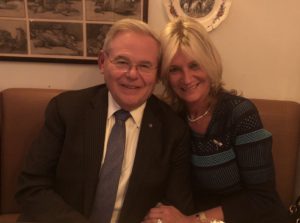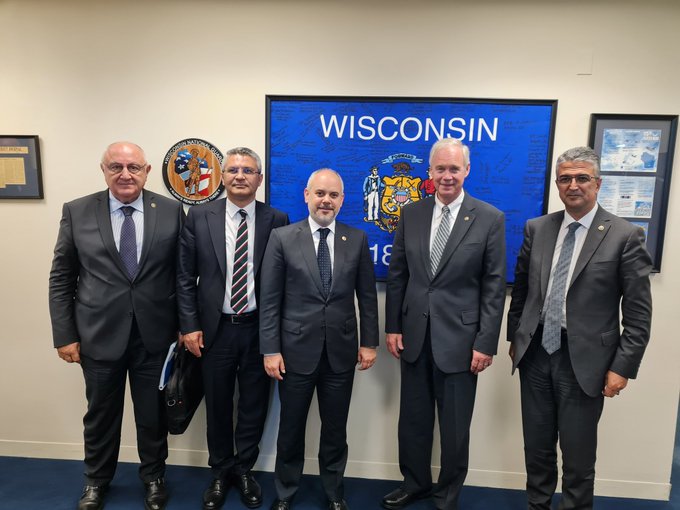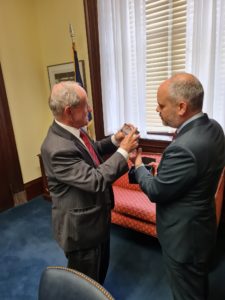Levent Kenez/Stockholm
A Turkish lawmaker last week harshly criticized a prominent US senator for prioritizing his family relationships at the expense of damaging ties between Turkey and the US.
Heading a parliamentary delegation to Washington, D.C., Akif Çağatay Kılıç, chairman of the Turkish Parliament’s Foreign Affairs Committee, expressed displeasure that his interlocutor, Senator Bob Menendez, chairman of the US Senate Foreign Relations Committee, did not respond to his request for a meeting.
Kılıç claimed Senator Menendez behaved this way because his wife is Armenian and that he did not want to hear the truth about the Armenian genocide.

“We know his wife is in the Armenian diaspora. It’s not right to make moves in politics based on populist and family motives that could damage relations with a country, a parliament and a nation,” Kılıç said.
“It is significant that even a dialogue is not sought here, or at least that a request for an appointment was not answered,” he added.
In April US President Joe Biden formally recognized the mass killing of Armenians in the Ottoman Empire during World War I as genocide, making him the first US president to recognize the massacre as an act of genocide.
Turkish President Recep Tayyip Erdoğan’s close lawmaker Kılıç did not explain why the Turkish delegation did not visit the US and meet with their counterparts prior to Biden’s historic decision that had been expected by almost every Turkish and Armenian circle since Biden was elected president in November 2020.


The Turkish delegation last week met with several senators and members of the House of Representatives, among them Ron Johnson and Jim Risch from the Senate Foreign Relations Committee chaired by Menendez. The delegation also met representatives from the Atlantic Council’s Rafik Hariri Center for the Middle East and the US Chamber of Commerce. The delegates also joined a round table discussion with several experts on Turkish-American relations at the Washington office of the Turkish government-funded SETA think tank.
Contrary to Kılıç’s claim, Senator Menendez has long worked for the official recognition of the Armenian genocide. A quick study of his Capitol Hill record suggests that his position on the Armenian issue has been unwavering, and he was known for his pro-Armenian stance long before he was elected to the Senate in 2006. Menendez married his Armenian fiancée Nadine Arslanian in 2020 after dating for several years. The couple is said to have first met in 2011. He previously sponsored many resolutions for recognition of the genocide. In 2009 Menendez himself introduced a Senate resolution that called on the president to officially recognize “the systematic murder of 1.5 million Armenians between 1915 and 1923 as genocide.” In April 2019 he submitted a non-binding resolution with a bipartisan group of 15 senators including then-Senator Kamala Harris, who is now vice president of the United States. Some Armenian groups hailed Arslanian’s influence on the resolution, and in a Youtube interview titled “She Was the Link,” Arslanian was presented as the Armenian woman who” influenced the passage of the Armenian Genocide bill in United States” in 2020. She also elaborated on her family story of survival and her relationship with Menendez in the interview.
Ironically, in 2010 Menendez was criticized for opposing career diplomat Matthew Bryza’s nomination as ambassador to Azerbaijan for the reason that Bryza’s wife was Turkish. Menendez denied that his position had anything to do with the ethnic origin of Bryza’s wife, claiming that he was uncomfortable with Bryza’s opposition to recognition by Turkey of the Armenian genocide and his close ties to individuals in the Turkish government.
Erdoğan and Biden met for the first time at the NATO summit in Brussels in June after Biden’s Armenian move that disappointed Turkey. Erdoğan said at a press conference before he departed Turkey that he would ask Biden about the Armenian genocide recognition and express Turkey’s discomfort. However, while answering journalists’ questions after the one-on-one meeting, he said, “Thank God, this issue was not brought up,” sparking criticism from the opposition, which accused him of speaking differently at home and abroad.
Nordic Monitor previously published secret documents which revealed that Kılıç, who is also vice president of the Parliamentary Assembly of the Council of Europe (PACE), had past links to a one-time al-Qaeda financier from Saudi Arabia. According to the document Kılıç, a former aide to President Erdoğan, was identified as having developed a relationship with Yasin al-Qadi, listed as an al-Qaeda financier on both the US Treasury and UN lists for many years, and his son Muaz al-Qadi (Kadıoğlu). The document, which was stamped “secret,” detailed an intercepted communication of Kılıç with al-Qadi’s son. The two sounded very friendly on the phone according to a readout from the transcript.
After working closely with Erdoğan for years, Kılıç ran for parliament in 2011 on Erdoğan’s party ticket. He was appointed in December 2013 as minister of youth and sports. In September 2016 Kılıç was involved in a major scandal with German broadcaster Deutsche Welle (DW), which conducted an interview with him for its flagship political talk show, “Conflict Zone.” The reporter, Michel Friedman, asked Kılıç questions about a failed military coup on July 15, 2016, mass purges and arrests that began in the aftermath of the abortive putsch, the situation of the Turkish press and the place of Turkish women in society. When the DW team was preparing to leave the ministry building after the interview, the minister’s press advisor came and told the team that they could not air the interview. When the team refused to agree, ministry officials told them they would not be able to leave the building without handing over the video footage of the interview, after which they seized it. DW General Director Peter Limbourg strongly condemned Turkish authorities for their confiscation of the video footage of the interview with the Turkish minister.
Kılıç was removed from his ministry position in a cabinet reshuffle in 2017. He ran for parliament again in 2019 and was elected as a deputy from Istanbul.












